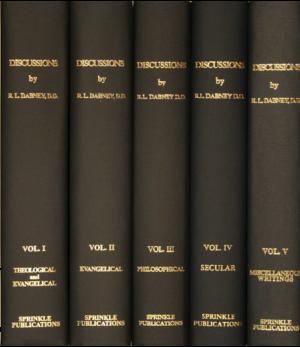The great Southern Presbyterian theologian Robert Lewis Dabney has been mentioned a number of times on this site. It is a very telling indication of our times that such a visionary man is so little known, and usually slandered when mentioned at all. You can find the entire collection of his written works at the Dabney Archive, all of which are well worth reading. However, such a massive undertaking can be a bit overwhelming, and so on Sundays I will continue what Nathanael began: I will post bite-sized excerpts from Dabney’s works, with perhaps a little bit of my own commentary. This will be done in hopes of promoting wider readership for this great man. You can find links to all the previous “Dabney on Sunday” posts at the bottom of this post.
The following excerpt is taken from an article Dabney wrote which appeared in the Southern Pulpit (April 1881), entitled “Vindicatory Justice Essential to God.”
In the first revelation which God ever made to man, that of Paradise, justice was declared as clearly as grace. Was the garden adorned for man’s occupancy by the lavish hand of divine benevolence, and was eternal and assured blessedness offered him on the easy terms of refraining from the fruit of one tree? Yet justice added the threat: “In the day that thou eatest therof, thou shalt surely die.” As soon as innocent man fell, and it became necessary to reveal a religion for sinners, the foremost point of this creed was the necessity that sin must be punished for the satisfaction of the divine perfections. The chief aim of God, in every institution of Old Testament religion, was obviously to make this prime truth stand out to the apprehension of sinners. What was the prominent addition made to the worship of Paradise? Bloody sacrifice, and that undoubtedly ordained by God, since Abel’s faith in offering it must have had such a warrant. And this remained the grand characteristic of the religion for sinners until the Lamb of God came, who taketh away the sin of the world. Wherever the patriarchs approached the throne of grace, there the altar must be reared: before the gates of the lost Eden; on the steaming soil of the earth, just yielded up by the avenging waters; on the plains of Mamre; at Horeb, and through all the centuries of the sanctuary, the orisons of faith and penitence must be accompanied with the streaming blood of a victim and the avenging fire of the altar. They could only rise to heaven when attended by the smoke of sacrifice. God was thus teaching all ages this foundation truth of the theology of redemption, that “without the shedding of blood there is no remission.” The guilt of sin must be avenged by the just penalty, for the satisfaction of God’s perfections, before the sinner can be forgiven.
But this principle, which God so obviously places in the forefront of his gospel, is one to which the carnal mind is most obtuse. This strange and obstinate forgetfulness is manifested at once by the crude notions of the people, and the speculations of the scholar. Investigate the alarmed conscience, not yet taught of the Spirit, and you will usually find an utter unconsciousness of the necessity for satisfaction for guilt, and of the true object of Christ’s sacrificial sufferings. Ask the distressed sinner how he hopes to be forgiven. He will tell you, “For the sake of my repentance;” or “of my prayers;” or “of my new obedience;” or “of my penances.” Anything rather than the one Bible answer, “For the merit of the penal sufferings and death of my divine substitute.” And when you have swept away those refuges of lies, and even left the cowering soul desperate of all other resort, you may hold up this, the only source of pardon, to his despairing eyes, and he will turn away unsatisfied and stolid. The cross is “unto him foolishness,” unless he who commanded the light to shine out of darkness shine into his mind to teach him its glory.
So the speculations of carnal science betray a similar incompetency of the fallen mind of sinners for this fundamental truth. Let philosophy, falsely so called, set itself to devise a theory accounting for the infliction of punishment on sin, or for the necessity of Christ’s sacrifice, and you shall hear any inconsequent scheme whatsoever, rather than the true one. One dreamer will tell us that punishment is not the decree of God’s special providence at all, but the regular and unavoidable effect of the system of nature, as though that system were aught else than the expression of God’s almighty will. Another will teach that God’s vindicatory justice is nothing but “benevolence guided by wisdom;” that love is the only essential attribute of God’s moral nature; that the true end of punishment is the reformation of the offender, or, at most, the politic and benevolent expedient to deter men, free agents, from sin, and thus save them from its unavoidable miseries. When they come to explain the sacrifice of Calvary, they are, accordingly, ready to give any other than the true account of it. “It was designed to attest the divine benevolence offered us in the promises.” “It was to instruct us by a splendid example of disinterestedness.” “It was to melt our hearts by the spectacle of dying love.” “It was to exhibit a dramatic spectacle of the evil of sin.” Truly, saith the sacred Scriptures, it was incidentally all this; but because it was chiefly and primarily intended to satisfy God’s holy perfections by paying the penalty of sin.
Previous Dabney on Sundays:
Universal Suffrage
Abstractions
Redefining Terms
False Philosophies
Abolishing Religion
Cruelty of Humanitarian Philanthropy
Southern Slavery
Labor Unions
Secularized Education
Patriotism
Preaching, Part 1, Part 2, Part 3
Doctrinal Confessions, Part 1, Part 2, Part 3, Part 4, Part 5, Part 6
| Tweet |
|
|
|





